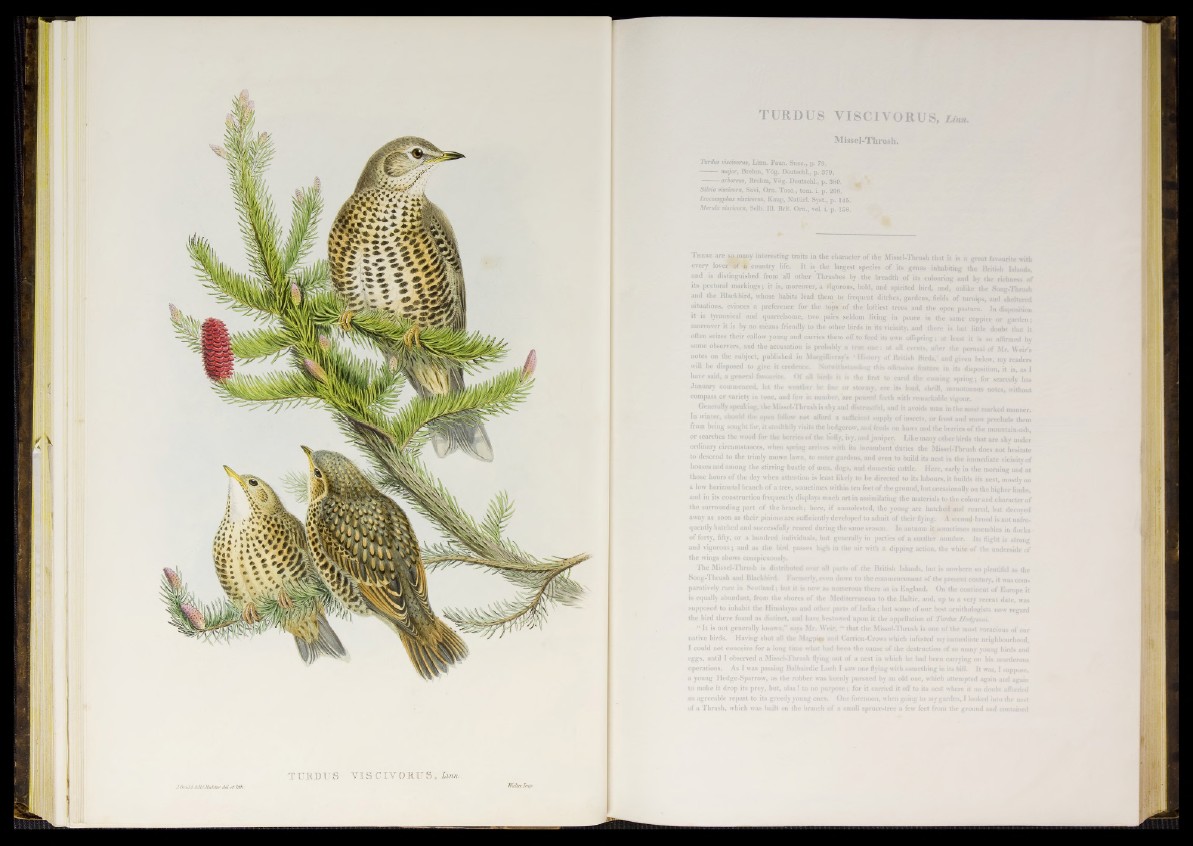
TU R D U S V IS C IV O H U S , Zirav.
Missel-Thrush.
Turdus viscivoms, Linn. Faun. Suec., p. 79.
major, Brehm, Vög. Deutschi., p. 379.
arboreus, Brehm, Vög. Deutschi., p. 380. %
Silvia viscivora, Sävi, Orn. Tose., tom. i. p. 208.
Ixocossyphis viscivorus, Kaup, Natiirl. Syst., p. 145.
Merula viscivora, Selb. 111. Brit. Om., vol. i. p. 158.
T h e r e are so.many interesting traits in the character o f the Missel-Thrush that it is a great favourite with
every lover -of f country life. It is the largest species o f its genus inhabiting the British Islands,
and is distinguished from all other Thrushes by the breadth o f its colouring and by the richness of
its pectoral markings; it is, moreover, a rigorous, bold, and spirited bird, and, unlike the Song-Thrush
and the Blackbird, whose habits lead them to frequent ditches, gardens, fields of turnips, and sheltered
situations, evinces a preference for the tops o f the loftiest trees and the open pasture. In disposition
it is tyrannical and quarrelsome, two pairs seldom living in peace in the same coppice o r g arden;
moreover it is. by no means friendly to the other birds in its vicinity, and there is but little doubt that it
often seizes their callow young and carries them off to feed its
nspri
least it I
some observers, and the accusation is probably a true o n e : «
notes on the subject, published in Macgiilivray’s ‘ History o
i Birds,’
will be disposed to give it credence. Notwithstanding this
have said, a general favourite, i >f all birds it is the first t<
January commenced, let the weather
compass or variety in tone, and few in i
Jy speaking, the Missel-Thrush is shy aud
should the open fallow not afford a suffic
f sought for, it stealthily visits the hedgerow
affirmed by
perusal o f Mr. Weir’s
veil below, my readers
a tiding tins offensive feature in its disposition, it is, as I
the first to carol toe coming spring; for scarcely has
i poured forth with remarkable vigour,
distrustful, and it avoids man in the most marked manner,
ftcieut supply o f insects, or frost and snow preclude them
Gene
In wint<
from be
I feeds on haws and the berries of the mountain-asb,
or searches the wood for the berries
juniper. Like many o ther birds that are shy under
ordinary circumstances, when spring
uinbent duties the Missel-Thrush does not hesitate
to descend to the trimly mown lawn
is, and even to build its nest in the immediate vicinity of
houses and among the stirring bustle o f men, dogs, and domestic cattle. Here, early in the morning and at
those hours o f the day when attention is least likely to be directed to its labours, it builds its nest, mostly on
a loiv horizontal branch o f a tree, sometimes within ten feet of the ground, but occasionally on the higher limbs,
and in its construction frequently displays much a rt in assimilating the materials to the colour aud character of
the surrounding p art o f the branch; here, if unmolested, the young are hatched and reared, but decoyed
away as soon as their pinious are sufficiently developed to admit of their dying. A second brood is not (infrequently
hatched and successfully reared during the same s
of forty, fifty, o r a hundred individuals, but generally in partiei
in autumn i( so me turn
of a smaller number.
and vigorous; aud as the
the wings shows conspicuoc
ubles in flocks •
light is strong
bird passes hig
The Missel-Thrush is distributed over a!
Song-Thrush and Blackbird. Formerly, ev
paratively rare in Scotland; but it is now a
is equally abundant, from the shores o f the
supposed to inhabit the Himalayas and olhe
the bird there found as distinct, and have b
“ I t is not generally known,” says Mr. \V
native birds. Having shot all the Magpies
I could not conceive for a long time what h
eggs, until I observed a Missel-Thrush flyiiij
operations. As I was passing Balbairdie L
a young Hedge-Sparrow, as the robber was
to make it drop its prey, but, alas! to no pi
an agreeable repast to its greedy young ones
of a Thrush, which was built on the branch
i dipping c ; white of
I parts o f the British Islands, but is tun
*n down to the commencement o f theprei
> numerous there as in England. On tin
Mediterranean to the Baltic, and, up to
r parts o f In d ia; but some o f our best or
¡stowed upon it the appellation o f Turdus Hodgsoni.
eir, “ that the Missel-Thrush is one of the most von
aud Carrion-Crows which infested m
id been the cause o f the destruction
\ out of a nest in which he had beet
>ch I saw one flying with something i
vhere so plentiful as the
sent century, it was com-
e continent o f Europe it
a very recent date, was
mthologists now regard
nmediate neighbourhood,
so many young birds and
irrying on bis murderous
:s bill. It was, I suppose.
:enly pursued by an old one, which attempted as
ose; for it carried it off to its nest where it iio d
One forenoon, when going to my garden, I lookci
a small spruce-tree a few feet from the ground ;